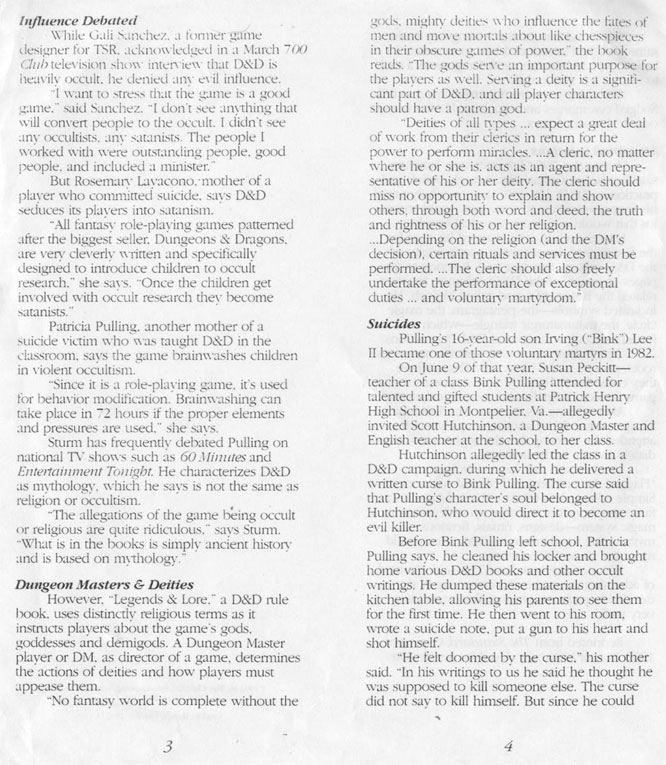
|

|
Main > Dungeons & Dragons: Adventure or Abomination? > Pages 3-4 Dungeons & Dragons: Adventure or Abomination?  Notes and corrections Page 3 ...acknowledged... that D&D is heavily occult... - In most cases where the word "occult" is thrown around the way that it is in this pamphlet, there is often no clear definition given to the meaning of the word. Webster defines "occult" thusly:* adj 1:
not revealed : secret 2: not easily apprehended or understood :
abstruse, mysterious 3: hidden from view : concealed 4: of
or relating to the occult 5: not manifest or detectable by
clinical methods alone; also: not present in macroscopic amounts
n. : matters regarded as involving the action or influence of supernatural or supernormal powers or some secret knowledge of them Much of our entertainment - television, movies, and literature - involves mystery, secret knowledge, and supernatural elements. It makes for great storytelling. By these definitions, anything mysterious or out of the ordinary could be considered "occultic," and any sort of quantifier would be pointless - something is either occultic or it isn't. Real-world witchcraft and paganism would be just as occultic as Tolkien, C.S. Lewis, Star Wars, Grimm's fairy tales, Lost, The X Files, Mary Poppins and Peter Pan. Supernatural events occur in the Christian Bible, the Talmud, the Koran, and the sacred texts of almost every other world religion, as well as much of our classic literature: A Christmas Carol, Hamlet, A Midsummer Night's Dream, Rime of the Ancient Mariner, War of the Worlds, and most of the works of Edgar Allen Poe. Which of these are "occultic," and which aren't? Of course, Sanchez and CBN likely aren't using the Webster's defintion of "occult" here, and their definition is vague enough to include anything that they do not approve of. (* Definition taken from the Merriam Webster website at www.m-w.com) "Since it is a role-playing game, it's used for behavior modification." - Role-playing games are used for entertainment, and not behavior modification. There are not many guidelines for how players should behave outlined in any of the Dungeons & Dragons manuals, other than some general suggestions on how to deal with unruly or disruptive players. For something that is supposed to be a method of behavior modification, there is a lot lacking in the way of instruction. While someone could use a role-playing game for behavior modification, it wouldn't be any different than using a sport or other activity the same way - it would be outside of the original purpose of the activity, and wouldn't be a proper justification for banning it. Dungeon Masters & Deities - Many critics of Dungeons & Dragons and other fantasy role-playing games will use the existence of gods and goddesses in the game as ammunition that it is "occultic," sometimes even going as far as to suggest that the game encourages the players to worship and serve them. In reality, deities in the game serve to enrich the mythology of the storytelling. They can provide background and motivation for the characters in a game, and aren't presented as anything that the players of the game should serve or worship. In fact, at the time this pamphlet was written, the core rulebooks of D&D did not include specific information about deities - this information was optional, and provided in the Legends and Lore (or Deities & Demigods) book. A Dungeon Master player or DM, as director of a game, determines the actions of deities and how players must appease them. - CBN actually gets it right here, but doesn't seem to realize how it hurts their case. This statement explains how deities are handled in D&D and other roleplaying games - as high-powered non-player characters that the Dungeon Master controls, and not as any real deities that the players must worship. Page 4 Pulling's 16-year-old son... became one of those voluntary martyrs in 1982. - While this is a very dramatic way to start off the "Suicides" section of the pamphlet, it is far from the real story of "Bink" Pulling. |
